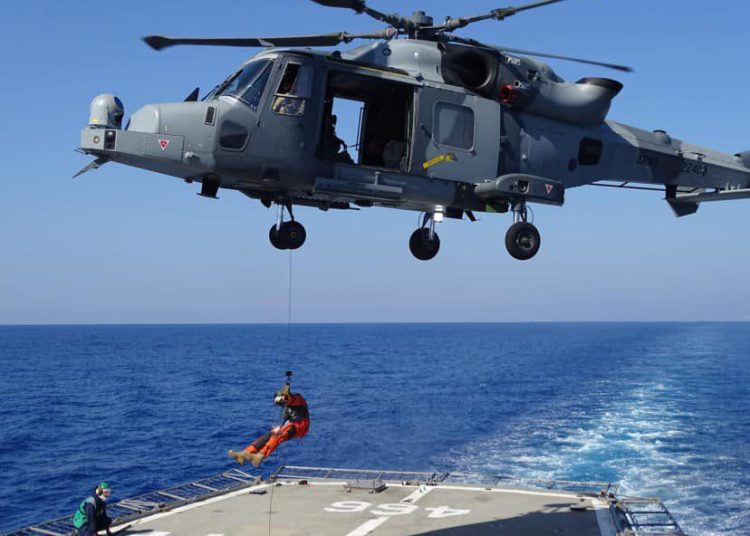Nordic Monitor
The NEMESIS 2020 exercise was conducted in the eastern Mediterranean at a time when Turkey’s Oruç Reis seismic exploration vessel was carrying out activities in the region.
Cyprus, Egypt, France, Greece, Italy, Israel, the United Kingdom and the US as well as six private companies participated in the multinational NEMESIS 2020 exercise with their assets and personnel on October 14.
On October 11 Turkey had issued a new Navtex (Navigational Telex) for the Oruç Reis seismic exploration vessel to carry out activities south of Kastellorizo (Meis), a Greek island located two kilometers off Turkey’s southern coast near the resort town of Kaş, until October 22. The vessel will conduct seismic studies in the eastern Mediterranean together with two other vessels, the Ataman and the Cengiz Han.
NEMESIS 2020 focused on “antiterrorism, search and rescue and antipollution operations with the aim of safeguarding economic activities in the Mediterranean region.” Twenty-one maritime units and 12 air assets joined, and special operations teams executed various scenarios during the exercise.
Turkish drill ship Yavuz was operating southwest of Cyprus and left the area on October 5. Its activities were most recently extended until October 12. The Yavuz first began operations east of Cyprus in July 2019.

“We, the Republic of Cyprus, with high sense of responsibility regarding the international community and having in mind our obligations towards the International Laws, are making every effort for constant upgrading of our procedures dealing with emergency situations such as antiterrorism operations, Search and Rescue, and pollution of marine environment, within our Exclusive Economic Zone [EEZ],” Defense Minister Charalambos Petrides said on Wednesday.
During a speech at the exercise Petrides underlined “the importance of the utilization of hydrocarbons within the Cyprus EEZ,” adding that Cyprus is “actively pursuing the maximization of cooperation and coordination of all the involved parties, public and private sector entities, based on the international laws and European Union Directives through initiatives like this particular exercise.”
Last year, the annual exercise was held in November, with Cyprus, Greece, France, Israel, the US and the UK taking part with 13 vessels and four aircraft and helicopters.

Following Turkey’s announcement regarding the Oruç Reis last week, US State Department Spokesperson Morgan Ortagus in a statement defined the Turkish government’s move as “calculated provocation” in the eastern Mediterranean.
“The United States deplores Turkey’s October 11 announcement of renewed Turkish survey activity in areas over which Greece asserts jurisdiction in the Eastern Mediterranean,” the statement said.
German Foreign Minister Heiko Maas called off his visit to Ankara to demonstrate his country’s solidarity with Cyprus and Greece. Maas was planning a three-stop trip including Turkey, Greece and Cyprus.
In summer Turkey issued a Navtex for its search for oil and gas to the south and east of Kastellorizo (Meis). A day later, another Navtex was issued by Greece in response to the advisory published by Turkey’s navy.

As the tensions were rising, German Chancellor Angela Merkel intervened by holding phone calls with Turkish President Recep Tayyip Erdoğan and Greek Prime Minister Kyriakos Mitsotakis to prevent a possible military confrontation.
Turkey then temporarily suspended its research plans for oil and gas exploration in the region. But the Yavuz continued its drilling in the disputed Mediterranean waters off Cyprus.
NATO recently hosted a series of technical talks between Turkish and Greek military delegations that resulted in an agreement on a bilateral military deconfliction mechanism. The agreement also included the establishment of a hotline for use by senior officials from both countries to prevent a military confrontation over the dispute.












